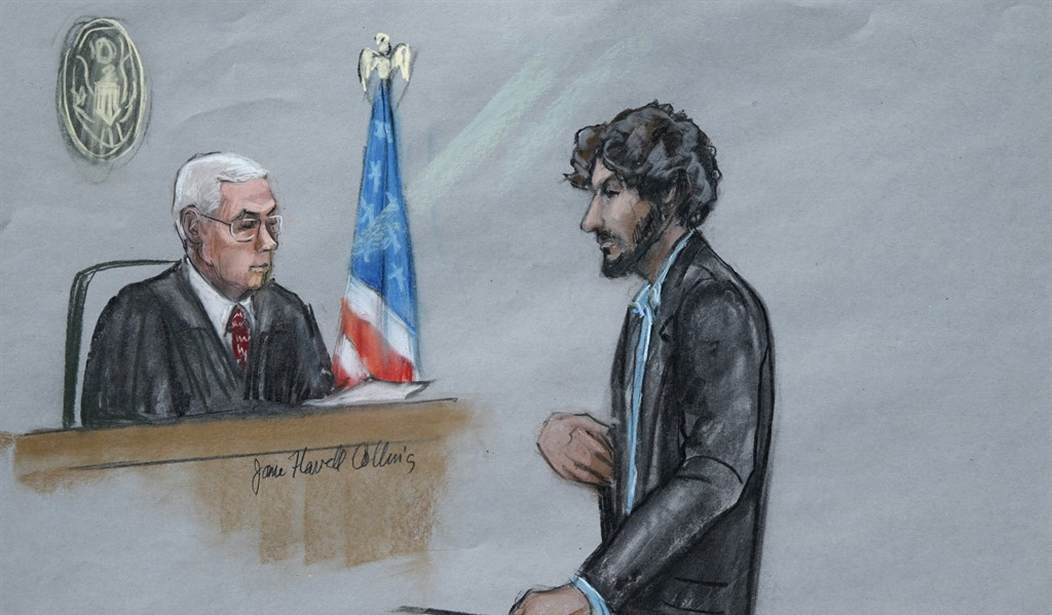All the Boston Marathon jihad murderer Dzhokhar Tsarnaev did was murder three people; why is everyone being so mean to him? Young Tsarnaev is suffering, and he wants you to feel his pain: CBS Boston reported Wednesday that he has filed a hand-written lawsuit claiming that he has been mistreated in prison. This complaint shows that the killer, besides being a confirmed jihadi with the deaths of several infidels on his record, has also mastered what has proved to be in many cases the most lucrative game of all: the game of victimhood.
In his plaintive handwritten lawsuit filing, Tsarnaev claims the Bureau of Prisons and Attorney General Merrick Garland are “interfering with his ability to communicate with his family, placing a hold on his money and hurting his chances of avoiding a death sentence.” He says that he has been forbidden to send photos to his family since 2019, and that this has been well-nigh unbearable: “I am suffering psychological injury, emotional distress and destruction of my familial relationships.”
Tsarnaev acknowledged that his nieces and nephews are allowed to come visit him, but complained that he is not allowed to call or write them, “which he said is cruel and unusual punishment. He is allowed to speak to his parents and sisters by phone twice a month.”
Gee, that’s tough. At this point it is useful to recall those killed in Tsarnaev’s bombings: Lingzi Lu, a 23-year-old graduate student; Krystle Campbell, a 29-year-old restaurant manager; and Martin Richard, who was all of eight years old. What kind of distress are the families of Lingzi Lu, Krystle Campbell, and Martin Richard experiencing?
It gets even worse for the poor lamb. “He said he was issued a face mask due to the COVID-19 pandemic and was reported when the face mask was missing a metal nosepiece. Tsarnaev said the mask was manufactured without the nosepiece and inclusion of the incident as a reason for special administrative measures violated his Fifth Amendment right to due process.”
Some of this may have to do with the fact that Tsarnaev has not exactly been a model prisoner. Every year since 2013, his prison privileges have been restricted in various ways with Special Administrative Measures (SAMs), as a result of his “proclivity to violence.” These are reviewed every year, and every year Tsarnaev has gotten them again.
“As a result of the imposition of the SAMs restrictions,” he complains, “I have experienced continued, extreme, and unjustifiable difficulties communicating and corresponding with family members and attorneys.”
Tsarnaev has reason to be glad that he is even able to make this complaint. The Boston Globe reported last July that “in a 182-page ruling that infuriated some victims [no kidding], the US Court of Appeals for the First Circuit ruled that George A. O’Toole Jr., the judge in Tsarnaev’s 2015 trial, ‘did not meet the standard’ of fairness while presiding over jury selection.” The appeals court accordingly overturned Tsarnaev’s death sentence. Aside from cheating Tsarnaev out of his 72 virgins, this denied justice to his victims.
Judge O. Rogeriee Thompson wrote that “a core promise of our criminal justice system is that even the very worst among us deserves to be fairly tried and lawfully punished.” That was undeniably true, as is Thompson’s observation that the bombings were “one of the worst domestic terrorist attacks since the 9/11 atrocities.”
But how unfair was the trial in fact, and how unfair could it have been? There is no question that Dzhokhar Tsarnaev is guilty. His actions were captured on video and abundantly documented. What’s more, he remained defiantly unrepentant for a considerable period after the attack. As prosecutors argued in April 2015 that he deserved the death penalty, they released a video of Tsarnaev three months after his attack, looking into the security camera in his cell, primping his hair in the reflection, and then flashing the V sign and then giving his middle finger to his jailers.
And why not? He believed he had done a righteous deed. The motivations of Dzhokhar and his brother and fellow jihad murderer Tamerlan Tsarnaev became clear very quickly after Dzhokhar was apprehended. CNN reported a week after the bombings that “Dzhokhar Tsarnaev, wounded and held in a Boston hospital, has said his brother—who was killed early Friday—wanted to defend Islam from attack.”
And just before he was captured, when he was hiding out inside a pleasure boat, Dzhokhar wrote a long self-justification on the inside of the boat, including the line: “When you attack one Muslim, you attack all Muslims.”
“I ask Allah to have mercy on me, my brother, and my family,” Tsarnaev said in 2015. And now he is asking the American judicial system to have mercy on him as well. But what about mercy for those he murdered and maimed? His victims have no chance to appeal the death penalty that he gave to them. Can they countersue?
Robert Spencer is the director of Jihad Watch and a Shillman Fellow at the David Horowitz Freedom Center. He is author of 21 books, including the New York Times bestsellers The Politically Incorrect Guide to Islam (and the Crusades) and The Truth About Muhammad. His latest book is Rating America’s Presidents: An America-First Look at Who Is Best, Who Is Overrated, and Who Was An Absolute Disaster. Follow him on Twitter here. Like him on Facebook here.










Join the conversation as a VIP Member